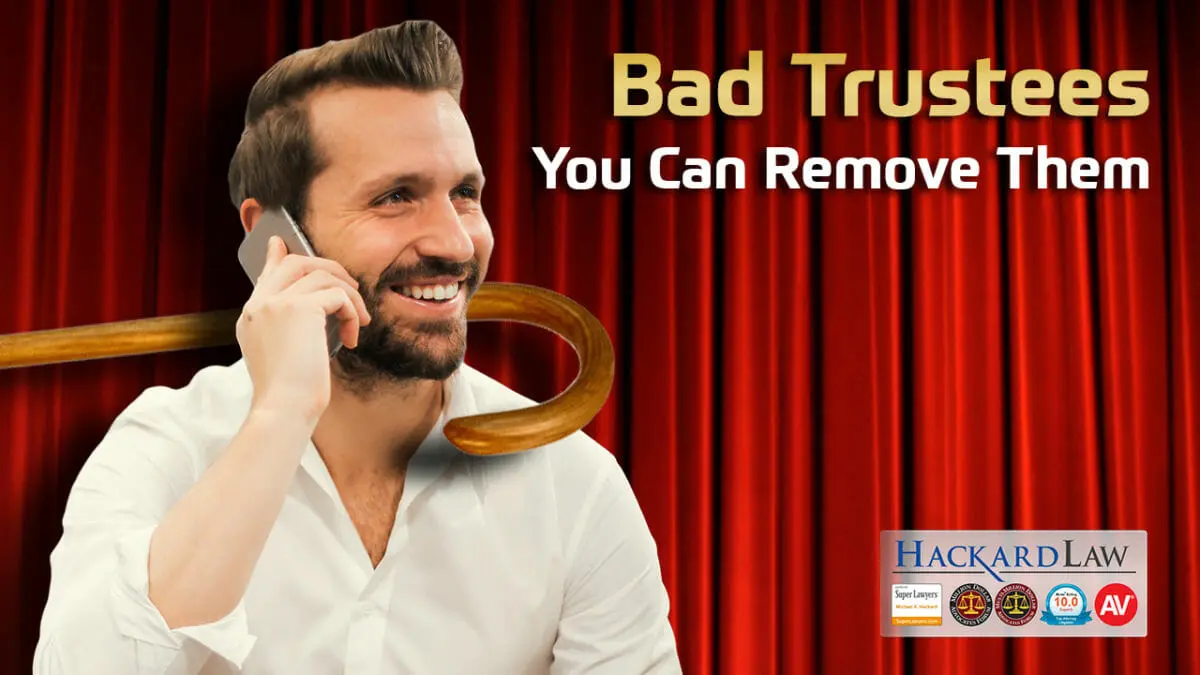
Can Trust Beneficiaries Sue the Trustee For Improperly Withholding Distributions?
Many beneficiaries of trust income do not realize the full extent of their legal rights regarding this income. While a trustee has some discretion to invest the principal value of trust property and distribute interest dividends amongst the trust beneficiaries, this authority is not unlimited. Beneficiaries who do not receive fair distributions of trust income have legal recourse against a trustee and, in some cases, may even be able to recover compensation from the trustee personally.
An experienced Santa Clara trust litigation attorney can help beneficiaries determine whether a trustee has violated their property rights, and how best to assert their rights in the future. At Hackard Law, we will listen to your story and recommend a course of action at no cost to you and with no obligation to retain us to represent you. Call us or send us an email today to schedule your free consultation.
What Are a Trustee’s Rights and Responsibilities?
A trustee is a fiduciary with a legal duty of care and duty of loyalty. The duty of care means that a trustee must act as a reasonably prudent investor would in similar circumstances. Unfortunately, this does not always occur, and sometimes trustees are careless with trust assets to the extent that the duty of care is violated. When this occurs, beneficiaries who are affected can often bring a legal action to recover for their losses.
The duty of loyalty means that trustees must not promote their own financial interests over those of the trust. Violations of this duty constitute misdeeds that may allow trust beneficiaries to remove the trustee from office, or even pursue criminal charges against the trustee for theft and other financial crimes.
In addition to these responsibilities, the trustee also has certain rights with respect to the management of trust income. The trustee may exercise discretion in investing trust property. Receiving interest payments and distributing them amongst the beneficiaries is also largely within the trustee’s discretion. However, this authority is not absolute.
What Legal Recourse is Available for a Beneficiary When a Trustee is Breaches his or Her Fiduciary Duties or Commits Financial Misconduct?
When trust beneficiaries first come to suspect that the trustee is engaging in misconduct, they often feel helpless and uncertain of what to do next. Fortunately, legal options can immediately stop the trustee from engaging in conduct that may jeopardize a trustee’s interests pending an investigation. Should evidence arise of misconduct, negligence, or breach of a fiduciary duty, trust beneficiaries can file a claim to seek compensation for any losses they have sustained.
Trust beneficiaries may bring a petition to the probate court to force distribution of improperly withheld interest payments. They may also bring a petition if the trustee is not investing and distributing in accordance with the express provisions of the trust, or in ways that improperly deplete the trust income.
In some cases, the parties can resolve these issues without litigation. By reviewing accounting records or investment documentation, a beneficiary and trustee may negotiate a solution amongst themselves. The representation of a lawyer can make reaching an out of court resolution significantly more likely, saving everyone involved time and money.
In particularly contested cases, however, the authority of the probate court may need to intervene. The probate court can order a trustee to make distributions, limit or modify the trustee’s authority, or remove the trustee from office altogether. An experienced trust litigator can help beneficiaries explore their legal options and find the best method of protecting their legal rights.
Protect Your Legal Rights to Trust Income
Challenging improper trust distributions—or a lack of distributions—does more than just protect your property rights to trust income. It also helps carry out the wishes of the person who established the trust. That’s why, if you benefit from a trust, you need to challenge a trustee’s improper actions. An experienced estate attorney at Hackard Law can help determine whether you have a valid legal challenge to trust distributions.
When Should You Retain an Attorney
Many concerned trust beneficiaries are unsure if their situation warrants talking to an attorney. They may believe that the situation will just “work itself out” or is not serious enough to justify the time an expense of working with a lawyer. Understand, however, that recovering money from a trustee who already spent it is harder than it is to stop a trustee from misappropriating assets in the first place. As a result, calling a lawyer as soon as you suspect trustee misconduct generally results in a better resolution than waiting until after a trustee has wasted or spent assets.
An experienced lawyer can help trust beneficiaries concerned about the way their trustee is managing their trust by:
- Reviewing the facts of the case and determining whether any evidence of misconduct exists
- Contacting the trustee and attempting to negotiate an out-of-court settlement to the dispute
- Filing a lawsuit on behalf of the trustee’s beneficiaries
- Representing the trustee’s beneficiaries in court
- If necessary, taking post-judgment action such as attempting to enforce the judgment or filing an appeal in the event of an adverse outcome
Contact a Santa Clara Trust Beneficiary Attorney Today
If you are trying to work through issues with an estate, and believe that you are not receiving a fair distribution from the trustee, seek help from Hackard Law to protect your rights. You can benefit from working with an experienced attorney who understands the depths of the law regarding estate planning while working through this complicated process.
To take the proper steps and schedule your free consultation with one of the experienced estate and trust litigation attorneys at Hackard Law, call us at (916) 313-3030 from Santa Clara and (213) 357-5200 from Los Angeles, or write us online today. We help trust beneficiaries throughout California. We are here and ready to review the details of your case.

 (916) 775-8542
(916) 775-8542